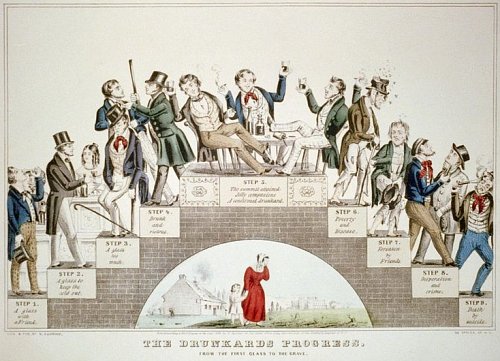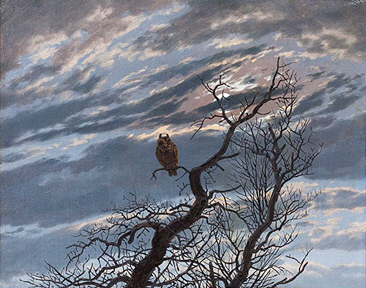
nephalist
n. a teetotaler

nephalist
n. a teetotaler

naupathia
n. seasickness
After an unusually queasy Channel crossing in 1868, Henry Bessemer conceived a steamer whose cabin was mounted on gimbals. In heavy seas the hull could roll beneath the passengers without rippling their cognac.
Work began immediately; in 1872 constructor E.J. Reed promised, “Although she may not fulfil every random prophecy that has been printed respecting her, she will thoroughly fulfil the object which the travelling public desire — namely, that of enabling us to cross to and from the Continent with health, decency, and comfort.”
The 350-foot S.S. Bessemer undertook her first public voyage on May 8, 1875 — and inauspiciously crashed into the pier. She moved too slowly and would not answer the helm. Investors lost confidence and the ship was eventually sold for scrap, but Bessemer insisted to the last that his conception had not been fully realized: “My hydraulic controlling apparatus was never completed, was never tested at sea, and consequently never failed.”

Everyone in Lyndon Johnson’s family had the same initials: Lyndon Baines Johnson, Lady Bird Johnson, Lynda Bird Johnson, and Luci Baines Johnson. His dog was named Little Beagle Johnson.
procerity
n. tallness
leptodactylous
adj. having slender toes or fingers
leptorrhine
adj. having a long, narrow nose
leptosome
n. a thin, frail, or slender person
windlestraw
n. a tall, thin person
blaguer
n. one who talks pretentiously
blatteroon
n. a senseless babbler or boaster
perissology
n. needless abundance of words
“Terms of approbation and eulogy in American dialect speech,” compiled by Elsie Warnock for Dialect Notes, 1913:
“The facetious terms ‘gobsloptious,’ ‘gobersloptious,’ ‘globsloptious’ and ‘supergobsloptious,’ ‘superglobsloptious,’ ‘superglobbersloptious,’ and ‘supergobosnoptious’ seem to be variant forms differing because of the desire of one person to outdo another in the force of his terms of eulogy.”
(Thanks, Owen.)
My heart is gayly purzed as if it wuy
Ra buyd about to dart in jeryous flight
To you; my darling, may it but alight
On vuygin surl. And may it not incuy
Your anger or disdain. ‘Tis but a fleuy
D’amour, and if you spuyn it you will blight
Its life as if some purzon in the night
Had been instilled into its depths. You stuy
My soul into a tuymurl. If you’ve turyed
With me, I fain would hie me to a clurster,
Wherein my heart would never be annuryed
By thoughts of love. My eyes grow murst and murster
At contemplating such an aching vurd —
O grant me, then, the sang-froid of an urster.
— Margaret Fishback, One to a Customer, 1937
propreantepenultimate
adj. last but four
(Thanks, Aleksejs.)

Suppose I write these phrases on a blackboard:
π
6
the sum of the numbers denoted by expressions on the board in Room 213
And suppose I’m in Room 213. It’s clear what the first two phrases denote, but what of the third? If it denotes the quantity k, then k = π + 6 + k, which is absurd. So the third phrase is pathological — it appears to denote a number but it doesn’t.
But if the third phrase doesn’t denote a number, then the sum of the numbers denoted by expressions on the board in Room 213 is π + 6 — and the third phrase has a clear meaning. Asks University of North Carolina professor Keith Simmons, “How can the same phrase be pathological and yet successfully refer?”
(Keith Simmons, “Reference and Paradox,” in JC Beall, ed., Liars and Heaps, 2003)

Advance the word GOD through the alphabet and you get OWL, SAP, and WET:

Whatever that means. Further multistep lettershifts:
ADD-BEE-ILL
BUS-HAY-PIG
IRK-RAT-VEX
MUD-WEN-AIR
OAF-WIN-COT
If we admit words of differing lengths, some interesting coincidences appear:




And, disturbingly,

Perhaps that owl is telling us something. See A Hidden Message.